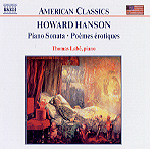What a wonderful discovery this CD presents, and what an important addition it is to Naxos’ American Classics series! Most listeners only know Howard Hanson as an orchestral composer, and a master of orchestration at that. But these idiomatic pieces show that he was thoroughly versed in writing for the keyboard. In fact, For The First Time, a delightful musical description of a day in the life of a child, was arranged for piano from the orchestral suite; yet it sounds so idiomatic on keyboard that we have to wonder if Hanson didn’t have piano in mind all the time. Everything on this CD is worth investigating, but it was the lush, passionate Etudes that grabbed me right away, especially the second, subtitled “Studio melodico”. And melodic it is, surging with potent, unabashedly Romantic tunes. Thomas Labé plays as if his very life depended on it, totally in command, completely aware of the vital “ebb and flow” of this music. The recorded sound is just short of demonstration caliber, too. All the pluses add up to a release that simply must be heard.
































